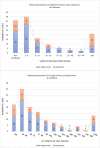Time in ICU and post-intensive care syndrome: how long is long enough?
- PMID: 38263124
- PMCID: PMC10807116
- DOI: 10.1186/s13054-024-04812-7
Time in ICU and post-intensive care syndrome: how long is long enough?
Abstract
Background: Our understanding of post-ICU recovery is influenced by which patients are selected to study and treat. Many studies currently list an ICU length of stay of at least 24, 48, or 72 h as an inclusion criterion. This may be driven by established evidence that prolonged time in an ICU bed and prolonged ventilation can complicate post-ICU rehabilitation. However, recovery after short ICU stays still needs to be explored.
Methods: This is a secondary analysis from the tracking outcomes post-intensive care (TOPIC) study. One hundred and thirty-two participants were assessed 6-months post-ICU discharge using standardised and validated self-report tools for physical function, cognitive function, anxiety, depression and post-traumatic stress disorder (with clinically significant impairment on any tool being considered a complicated recovery). Routinely collected data relating to the ICU stay were retrospectively accessed, including length of stay and duration of mechanical ventilation. Patients with short ICU stays were intentionally included, with 77 (58%) participants having an ICU length of stay < 72 h.
Results: Of 132 participants, 40 (30%) had at least one identified post-ICU impairment 6 months after leaving ICU, 22 (17%) of whom had an ICU length of stay < 72 h.
Conclusion: Many patients with an ICU length of stay < 72 h are reporting post-ICU impairment 6 months after leaving ICU. This is a population often excluded from studies and interventions. Future research should further explore post-ICU impairment among shorter stays.
© 2024. The Author(s).
Conflict of interest statement
The authors declare no competing interests.
Figures
References
-
- Girard TD, Pandharipande PP. Early mobilisation during critical illness: good for the body and brain. Lancet Respirat Med 2023. - PubMed
MeSH terms
Supplementary concepts
Grants and funding
LinkOut - more resources
Full Text Sources
Medical


